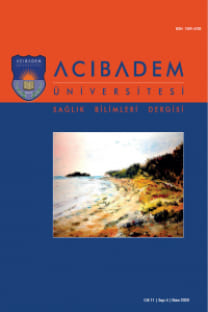Lise Öğrencilerinde Farklı Beslenme Eğitim Yöntemlerinin Beslenme Bilgi Düzeyine Etkisinin Karşılaştırılması
The Comparison of the Effects of Different Nutrition Education Methods on Nutrition Knowledge Level in High School Students
___
- 1. Erkan T. Ergenlerde Beslenme. Turk Pediatr Ars Derg. 2011;46:49-53.
- 2. Kayapınar FÇ, Aydemir R. A Survey of Eating Habits and the Nutrition Knowledge of High School Students (Kars Digor Anatolian High School). Int J Sci Cult Sport. 2014;2(6):21-38.
- 3. Şanlıer N, Konaklıoğlu E, Güçer E. Gençlerin Beslenme Bilgi, Alışkanlık ve Davranışları ile Beden Kütle İndeksi Arasındaki İlişki. Gazi Eğitim Fakültesi Derg. 2009;29(2):333-352.
- 4. Turconi G, Celsa M, Rezzani C, Biino G, Sartirana MA, Roggi C. Reliability of a Dietary Questionnaire on Food Habits, Eating Behaviour and Nutritional Knowledge of Adolescents. Eur J Clin Nutr. 2003;57:753-763.
- 5. Kalay R, Türkmen AS. Factors Affecting the Nutrition and Exercise Behaviours of Adolescents. Int Peer-Reviewed J Nutr Res. 2015;(5):1-14.
- 6. Astarlı Ö. Marmara Üniversitesi Tıp Fakültesi 1. Ve 5. Sınıf Öğrencilerinde Beslenme Bilgi Düzeylerinin ve Beslenme Alışkanlıklarının Değerlendirilmesi. Published online 2008.
- 7. Akman M, Tüzün S, Ünalan PC. Adölesanlarda Sağlıklı Beslenme ve Fiziksel Aktivite Durumu. Nobel Medicus. 2012;(1):24-29.
- 8. Condon EM, Crepinsek MK, Fox MK. School Meals: Types of Foods Offered to and Consumed by Children at Lunch and Breakfast. J Am Diet Assoc. 2009;109(2):67-78.
- 9. Shabiralyani Ghulam, Shahzad HK, Naqvi H, Nadeem I. Journal of education and practice. J Educ Pract. 2016;7(11):99-105. Accessed February 27, 2020. www.iiste.org
- 10. Micali FG, Diez-Garcia RW. Pictorial instrument of food and nutrition education for promoting healthy eating. Rev Nutr. 2016;29(6):917-928.
- 11. Wang D, Stewart D, Chang C, Shi Y. Effect of a School-Based Nutrition Education Program on Adolescents’ Nutrition-Related Knowledge, Attitudes and Behaviour in Rural Areas of China. Environ Health Prev Med. 2015;20(4):271-278.
- 12. Story M, Lytle L a, Birnbaum AS, Perry CL. Feasibility and Process Evaluation of the TEENS Study. J Sch Health. 2002;72:121-127.
- 13. Geçkil E, Yildiz S. Adölesanlara ;Yönelik Beslenme ve Stresle Başetme Eğitiminin Sağlığı Geliştirmeye Etkisi. Cumhur Üniversitesi Hemşirelik Yüksek Okulu Derg. 2006;10(2):19-28.
- 14. Wang D, Shi Y, Chang C, et al. Knowledge, attitudes and behaviour regarding nutrition and dietary intake of seventh-grade students in rural areas of Mi Yun County, Beijing, China. Environ Health Prev Med. 2014;19(3):179-186.
- 15. Günalan E, Bakır BO, Balı R, et al. Evaluation of Body Mass Index and Related Lifestyle Factors among 14-17 Years Old Turkish Adolescents. Northern Clinics of Istanbul. 2021; 8(3):226-235.
- 16. Yazıcıoğlu Y, Erdoğan S. SPSS Uygulamaları Bilimsel Araştırma Yöntemleri. Detay Yayıncılık; 2004.
- 17. Oz F, Aydin R, Onsuz MF, Metintas S, Emiral GO. Development of a Reliable and Valid Adolescence Nutritional Knowledge Questionnaire. Prog Nutr. 2016;18(2):125-134.
- 18. Balkış M. Lise Öğrencilerinin Beslenme Alışkanlıkları, Probiyotik Süt Ürünleri Tüketim Sıklıkları ve Bilgilerinin Belirlenmesi: Kulu Örneği. Published online 2011.
- 19. Raghunatha Rao D, Vijayapushpam T, Subba Rao GM, Antony GM, Sarma KVR. Dietary Habits and Effect of Two Different Educational Tools on Nutrition Knowledge of School Going Adolescent Girls in Hyderabad, India. Eur J Clin Nutr. 2007;61(9):1081-1085.
- 20. Pekcan G, Şanlıer N, Baş M. Türkiye Beslenme Rehberi 2015 (TÜBER). (PEKCAN G, Nevin ŞANLIER, BAŞ M, eds.).; 2016. Accessed June 3, 2019.
- 21. Güngördü E. Öğretimde Görsellik ve Görsel Araçlarda Bulunması Gereken Özellikler. Milli Eğitim Dergisi. Published 2003.
- 22. Choi HJ, Johnson SD. The Effect of Context-Based Video Instruction on Learning and Motivation in Online Courses. Am J Distance Educ. 2005;19(4):215-227.
- 23. Dargie F, Henry CJ, Hailemariam H, Geda NR. A Peer-Led Pulse-based Nutrition Education Intervention Improved School-Aged Children’s Knowledge, Attitude, Practice (KAP) and Nutritional Status in Southern Ethiopia. J Food Res. 2018;7(3):38.
- 24. Ghasemi V, Simbar M, Fakari FR, Naz MSG, Kiani Z. The effect of peer education on health promotion of iranian adolescents: A systematic review. Int J Pediatr. 2019;7(3):9139-9157.
- 25. Macarthur GJ, Sean H, Deborah M. C, Matthew H, Rona C. Peer-led interventions to prevent tobacco, alcohol and/or drug use among young people aged 11-21 years: A systematic review and metaanalysis. Addiction. 2016;(3):391-407
- 26. Forneris T, Fries E, Meyer A, et al. Results of a rural school-based peer-led intervention for youth: Goals for health. J Sch Health. 2010;80(2):57-65.
- 27. Sato PM, Steeves EA, Carnell S, et al. A youth mentor-led nutritional intervention in urban recreation centers: A promising strategy for childhood obesity prevention in low-income neighborhoods. Health Educ Res. 2016;31(2):195-206.
- 28. Akkus D. High School Youth Peer Education Program An Effective Model to Prevent Substance Abuse happen? J Psychiatr Nurs. Published online 2016;(1):34-44.
- ISSN: 1309-470X
- Yayın Aralığı: 4
- Başlangıç: 2010
- Yayıncı: ACIBADEM MEHMET ALİ AYDINLAR ÜNİVERSİTESİ
Figen ŞENGÜN İNAN, Neslihan GÜNÜŞEN, Murat KESER, İlhan ÖZTOP
Besleme Uygulamaları ve Yapısı Anketi Türkçe Geçerlik ve Güvenilirlik Çalışması
Hasan KAYA, Aybeniz CİVAN KAHVE, Saniye Gökçe SAYKAL, Nihan BÜYÜKLÜOĞLU, Rabia Nazik YÜKSEL, Erol GÖKA
Erratum: Comparison of Laparascopic and Open Adrenalectomy
Onur DULGEROGLU, Emine Özlem GÜR, Evren DURAK, Fatma TATAR, Özgün AKGÜL, İlker KIZILOĞLU, Tayfun BİLGİÇ, Yusuf KUMKUMOĞLU, Mehmet HACIYANLI
Kırılganlığın Serum D Vitamini Ve Paratiroid Hormon Düzeyleriyle İlişkisi
Şemsinnur Göçer, Özlem Balbaloğlu
Kayahan KARAYTUG, Mehmet EKİNCİ, Serkan BAYRAM, Yusuf BAYRAM, Savaş ÇAMUR, Sefa BATİBAY, Mehmet KAPICIOĞLU
Postpartum Dönemde Beslenme, Stres ve Uyku Durumunun Emzirme Tutumuna Etkisi
Merve SARI, Kezban ESEN KARACA, Gizem KÖSE
Evaluation of Feed Strategy for High Quality Biosimilar IgG Production in CHO Cell Fed-batch Process
Duygu AYYILDIZ TAMİS, Berna USTUNER, Secil DAYANKAC UNVER, Tunç TURGUT, Deniz BAYCIN
İrem Kaya Cebioğlu, Sema Aydın, Harika Özkaya, Elif Günalan, Ece Özbekkangay, Binnur Okan Bakır
Yetişkin Bireylerde Hedonik Açlığın Satın Alma Davranışı Üzerindeki Etkisinin Değerlendirilmesi
